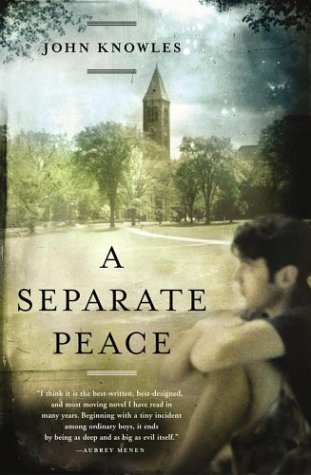This month's selection, John Knowles' A Separate Peace was made by yours truly. So, depending on your reaction to the book, "I'm sorry," or, "You're welcome."
For those of you who haven't had an opportunity to read A Separate Peace, here's the quick and dirty. The novel is set during the Second World War and centers around Gene (the narrator), Finny (Gene's "best friend"), and a handful of other students at an elite boarding school in New Hampshire. It's a classic coming of age story chock full of angst that is communicated through beautifully crafted prose. Gene and Finny are textbook foil characters. Gene, the brooding, bookish, rule-follower is the natural literary companion to Finny the larger-than-life, mischievous and athletic big-man-on-campus. The two are involved in an accident that badly injures Finny physically, sends Gene down a spiral of guilt, doubt and shame and forever alters their friendship and lives.
***SPOILER ALERT***
Ok, so, I'm just going to put this out there. I'm really not 100% certain that Gene intentionally caused Finny's accident. There. I've said it. Honestly, I'm not sure he was proactive and for lack of a better word, strong enough to make such a bold and vindictive move. For me it just doesn't gel with the rest of his character. I bring this up mainly because my opinion on that subject largely affects how I've read this book and what I think of it.
For me the brilliance of Knowles' work is that it dances around the disparity between memory and reality. As we initially get to know the two boys it is evident that Gene admires Finny and longs to be more like him. This for me became glaringly evident in chapter 3 with Gene's adoption of Finny's phrase, "naturally." It was my first hint that, in his mind, Gene was attempting to recreate himself in the image of his confessed rival. Gene was unhappy with who he was and desperate to become someone new. (Yep, sounds like high school to me.) As a result, Gene was never an entirely believable nor trustworthy narrator for me. His recollection of the nature of his relationship with Finny and most glaringly Finny's accident left me full of doubt. As I reread the passage describing the accident, there is no indication in the prose that his "knees bending" were an act of volition. Yet for the remainder of the novel he speaks as though he intentionally caused the incident. The chasm there between Gene's perceived memory and what really happened intrigued me. As a reader I was forced to make my own decision and interpret the situation for myself. There is something enticing about second guessing and not fully trusting the narrator of a novel. It kept me wrapped up in the story in a way I might not otherwise have been.
Needless to say, I really enjoyed this novel. As I said before, the prose was beautifully crafted and a pure delight. I found myself underlining passages (which I haven't done since college, by the way) because I was so impressed with Knowles' composition. All in all, I found it to be an enjoyable read.
But don't settle for my word on the novel. Head over to The Daily Snapshot to read Charlotte's and the others' reviews of the book. And feel free to join us next month as we read Love in the Time of Cholera by Gabriel Garcia Marquez.


